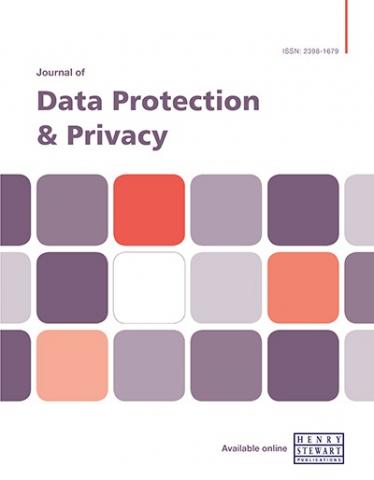"A journal that meets the needs of practitioners, policymakers and academics"
Call for Papers – The Future of Industrial and Consumer Internet of Things (IoT), Privacy and Data Protection in the wake of the Covid-19 Pandemic
Journal of Data Protection & Privacy
Call for Papers – The Future of Industrial and Consumer Internet of Things (IoT), Privacy and Data Protection in the wake of the Covid-19 Pandemic
Submission deadline: 30th April 2022
The Covid-19 pandemic magnified existing trends and challenges affecting how government, industry, workers and consumers behave, function and survive. The global digital economy presents opportunities and challenges, including the growth of the use of the Internet of Things in government, business and consumer sectors. Benefiting from the advantages as well as mitigating the IoT privacy and data protection risks is now a societal issue of significant importance.
In light of these developments, the Journal’s Editor in Chief and Publisher are pleased to announce a major special issue of Journal of Data Protection & Privacy which will examine the importance of IoT; explore and assess the privacy and data security issues IoT and its application raise; consider privacy laws which may and will impact on IoT technology and their applications; and muse on future developments of IoT and how privacy authorities may respond.
Journal of Data Protection & Privacy and its Editor, Guest-Editor and Publisher invite Chief Privacy Officers, CIOs, Heads of IT, Heads of Compliance, CMOs as well as other experts from academia, think tanks, the private sector, healthcare providers and agencies, government agencies, regulatory bodies, not-for-profits, international agencies and beyond, to share their views in this special edition of Journal of Data Protection & Privacy on the future of IoT, privacy and data protection in the wake of Covid-19.
Topics of particular interest for this special issue are:
IoT: Definitions and Importance
• Definitions
• Difference between industrial and consumer IoT
• Relationship of cloud, concentration and edge computing with IoT
• Agenda for UN Sustainable Development and IoT
• The Inmarsat Research Programme 2021
• Benefits and advantages of IoT for government, business and consumer sectors
Ethical dynamics in the use of IoT in government, business and consumer sectors
• Privacy and data protection risks arising as a result of IoT
• Digital ethics, algorithmic accountability and privacy
• AI Ethics Principles: Fairness, Transparency and Trust
• Ethical concerns of IoT for government, business and consumers
• How society can mitigate the risks and maximise the benefits of the use of IoT
Applications of IoT technology and privacy/security issues
• Smart energy used by utility companies to provide energy for consumers
• Smart retail online and virtual reality and in store technology
• Smart healthcare /smart health
• Smart security for the home/office
Global privacy and data protection laws and regulations that impact IoT Technologies and Applications
• Lack of leadership for the development in government, business and consumer sectors for the development of IoT
• Impact of the General Data Protection Regulation (GDPR)
• E-Privacy Regulation
• European Union Agency for Network and Information Security
The Future of Industrial and Consumer IoT and Data Protection and Privacy
Submission Guidelines
The deadline for the submission of articles to this special issue is 30th April 2022. The following types of articles will be considered for publication:
Practice Articles: Thought leadership pieces, regulatory updates, briefings, case studies and other contributions written by practitioners. Articles should be 2,000 to 5,000 words in length.
Research Papers: Contributions which explore new models, theories and research on IoT and data protection and privacy. The principal management implications of the submission should be included. Articles should be up to 6,000 words in length.
Author guidelines, sample articles and other relevant information about the journal can be found here.
Questions about this issue may be directed to the Editor, Ardi Kolah at ardi@kolah.com, Guest Editor, Sandeep Kautish at sandeep.kautish@lbef.edu.np and Daryn Moody, the Publisher at daryn@hspublications.co.uk
Manuscript submissions should be submitted to the Editor in Chief, Ardi Kolah.


